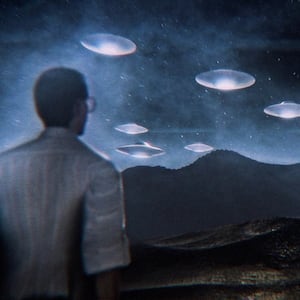The X-Files revival may have flamed out after two less-than-vital seasons (the show’s tenth and eleventh), but genre fans won’t have to wait long to satiate their hunger for paranoid out-of-this-world mysteries. That’s because on Jan. 8, the History Channel premieres Project Blue Book, a 10-episode series (executive-produced by Robert Zemeckis) that follows Chris Carter’s “The Truth is Out There” playbook while also indulging in some The Americans-style Cold War espionage—all via a premise that’s “based on real events.”
That disclaimer requires some context, since Project Blue Book is a fictional affair whose individual cases are inspired by Dr. J. Allen Hynek’s 1950s investigations into UFOs on behalf of the U.S. Air Force. Melding documented reports with a more fanciful interconnected-conspiracy storyline that’s the stuff of (likely) fiction, its focus is Hynek, a professor of astrophysics with a gift for inventing experimental technology and a dogged desire to prove things factually, here played by The Wire and Game of Thrones alum Aidan Gillen.
Enticed by the government’s offer to look into reports of flying saucers and other strange aerial phenomena, he’s paired with the younger, brasher Captain Michael Quinn (Michael Malarky), a pragmatist who most certainly doesn’t believe in the existence of little green men flying about in spaceships. And even if he did, Quinn is determined to debunk claims about such sightings and close cases as quickly as possible, per the orders of his superiors, General James Harding (Neal McDonough) and General Hugh Valentine (Michael Harney).
A man of science who becomes increasingly open to the prospect of extraterrestrial life, Hynek is the Fox Mulder to Quinn’s skeptical Dana Scully. Though that dynamic often makes the protagonists’ contentious dynamic feel old hat, Project Blue Book benefits from the participation of Gillen, who captures the wily Hynek’s struggle to reconcile his rational impulses with the insanity he’s experiencing; in a novel twist, his intellectual rigor is precisely what prevents him from ruling out scenarios that, at first glance, appear far-fetched. Moreover, creator David O’Leary’s show, whose first two episodes are smoothly directed by Robert Stromberg (Maleficent), establishes its conceit and character relationships swiftly, and with a minimum of straightforward exposition, the better to get right to the sleuthing action.
First up is Fargo, North Dakota, where Air Force pilot Fuller (Matt O’Leary) playfully flies by a football game, only to encounter a glowing orb that dances in front of his plane and, after he fires on it, sends him hurtling through the air and into the ground. He claims this object was a UFO, and furthermore, that it spoke to him in song—specifically “How High the Moon,” as broadcast from his West Coast hometown radio station. Quinn finds this difficult to believe, especially after he attempts to duplicate Fuller’s impossible airborne moves and fails spectacularly, nearly killing both himself and Hynek. Nevertheless, Hynek—struck by Fuller’s underlined pronouncement-cum-series-mantra, “Logic can’t begin to explain what we’re dealing with here”—persists. For his trouble, he’s guided by a mysterious man in a fedora and trenchcoat to a secret military hospital at an abandoned amusement park, where he watches a film featuring strange triangular symbols and children reading a string of numbers.
Hynek is soon convinced that there’s something larger afoot, and viewers won’t be shocked to discover that it involves McDonough’s transparently villainous General Harding, who from a war room modeled after the one in Dr. Strangelove, does his best to stymie Hynek’s work and cover up any plausible trace of extraterrestrial activity. That turns out to be quite rampant, as proven by later episodes involving fiery monsters, V-shaped flying crafts and mind-control experiments. In a post-Roswell world, Harding is compelled to keep a lid on America’s outer-space secrets. However, Project Blue Book, at least in the first six installments provided to press, rarely provides a good reason for precisely why Harding is so motivated to keep the public in the dark, save for the flimsy notion that knowledge of aliens would cause panic and provide a potential advantage to our enemies.
Those would be the Russians, whose undercover operative Susie Miller (Ksenia Solo) aims to gather intel by befriending Hynek’s wife Mimi (Laura Mennell). This subplot leads to some rather second-rate spy material, which mostly comes across as an excuse to give Mimi something to do, as well as a way to infuse the proceedings with a modicum of Atomic Age-related fears, via both her purchase of a bomb shelter and her son Joel’s nuke-attack school drills. The further Hynek and Quinn are ensnared in a web of lies and deceit, the more Mimi’s Red Scare storyline becomes related to the plot proper. Still, Project Blue Book generally grinds to a halt during her and Susie’s passages, not to mention elicits eye-rolls from Mimi’s wholesale cluelessness about her new BFF’s obviously shady behavior.
By grounding itself in “reality,” O’Leary’s series gains some measure of seriousness, albeit at the expense of the outlandish supernatural thrills that might make its individual stories—about green fireballs over a Nevada missile test base, and power outage-causing lights over Lubbock, Texas—more memorable. Project Blue Book would also benefit from more striking stylistic flourishes; aside from a great image of rockets reflected in Hynek’s glasses in episode 4, the show’s aesthetics are defined by muted grays and blacks, solid 1950s-era period details, and pleasurably cheesy computer-generated effects. Still, O’Leary lays a solid foundation for his far-reaching serialized narrative, populated by furtive G-Men, former Nazi aerospace wunderkinds and The Sopranos’ Michael Imperioli, even as he makes sure to keep the series playing, first and foremost, as an episodic procedural about visitors from the cosmos.
Even if it’s less nuanced than The Americans and a bit cornier than The X-Files, Project Blue Book has a pulpy energy that carries it over its rougher patches. Whether it has legitimately grand truths to uncover remains to be seen, but for now, it recognizes that concrete answers aren’t nearly as entertaining as mankind’s enduring (and tantalizing) quest to comprehend the great unknown.







